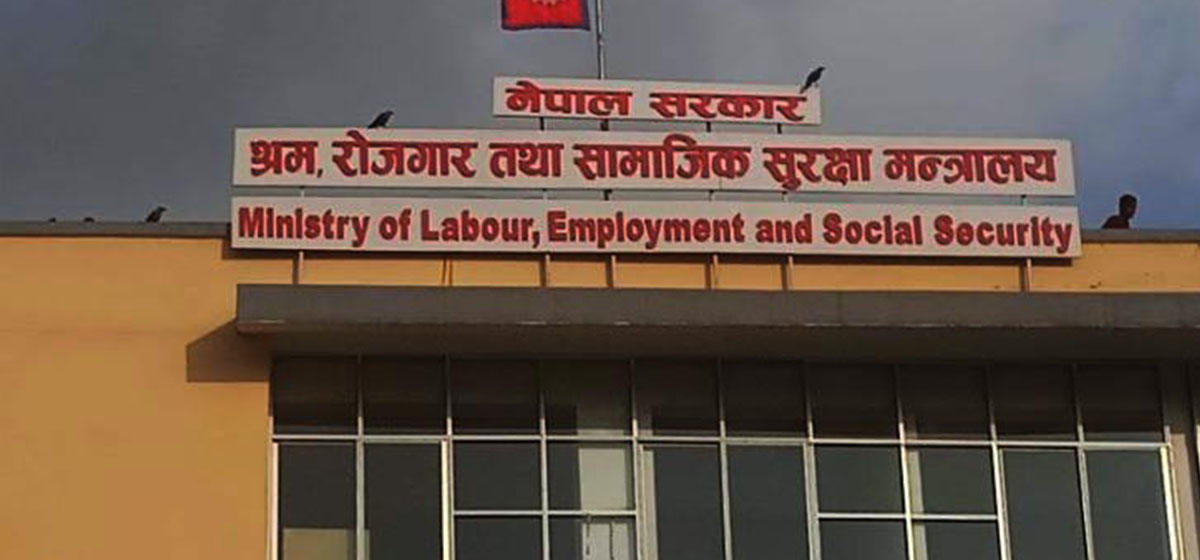Kathmandu – The Ministry of Labour, Employment and Social Security has released a national action plan on business and human rights to promote decent labor through the implementation of workers’ rights.
Minister of Labour, Employment and Social Security Sharatsingh Bhandari said that the action plan for the implementation of the United Nations Guiding Principles on Business and Human Rights has been created and the issues of the Guiding Principles are mainly included in the action plan.
Subjects included in the existing constitutional and legal system, long-term and periodic plans, human rights conventions approved by Nepal, International Labor Organization conventions, national and regional policies of the Government of Nepal, subjects included in the fifth national action plan on human rights, sustainable development goals and upgrading in developing countries. Related activities have been included in the action plan,’ he said.
The action plan includes the activities related to the observance of human rights, the prevention of the impact of commercial activities on human rights. The right to an adequate standard of living, fair and favorable working conditions, the right to water and sanitation, the right to education, the right to access to information, the right to development, the rights of workers, the rights of consumers, the rights of women and children, the rights of foreign workers, the rights of environmental and indigenous peoples, gender Issues related to equality and rights against caste discrimination and the rights of minority communities have also been included in the action plan, he said.
More than five dozen countries in the world have adopted the concept of responsible and accountable business and have formulated and implemented a national action plan on the implementation of the United Nations Guiding Principles on Business and Human Rights.
In 1977, the International Labor Organization (ILO) also issued principles on multinational enterprise and social policy through tripartite discussions between the government, entrepreneurs and workers. As interest in human rights in the commercial sector increased rapidly, the United Nations launched a campaign on the responsibility of the commercial sector for the respect and observance of human rights in 2000. After that, the concept that businessmen should not be portrayed as human rights violators but should always be responsible for the respect and assurance of human rights has been advancing. In this context, in 2011, the United Nations Human Rights Council adopted the Guiding Principles on Business and Human Rights.
Labor Secretary Kewal Prasad Bhandari said that due to the successful and effective implementation of the national plan, in case of violation of human rights, remedies and compensation will be easily obtained through judicial and non-judicial mechanisms. This ensures policy coherence between the government and the private sector in relation to business and human rights. Maintains professional competition and sustainability,” he said, ‘The purpose of protecting and empowering economically and socially backward classes and communities is to implement the commitments made by Nepal at the international level.’
Trade unions and private sector businessmen have pledged to support the effective implementation of this action plan. Jotsan Shrestha, vice president of the Federation of Nepalese Industries and Commerce, said that she played a role in creating this action plan with the involvement of the private sector. It is the private sector that ensures the most employment. The private sector has an obligation to respect the human rights of workers,” she said. “The private sector does not only look for profit. It is also fulfilling social responsibility.
Joint Trade Union Coordinating Committee (JTUC) Chairman Yogendra Kumar Kunwar said that Trade unions do not get their rights without human rights. This action plan is very important,” he said. “It can become a basis for creating decent work for economic change.”
The Ministry of Labor said that monitoring committees have been arranged at all three levels to implement the action plan.


 NP
NP